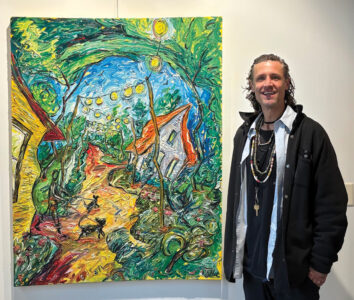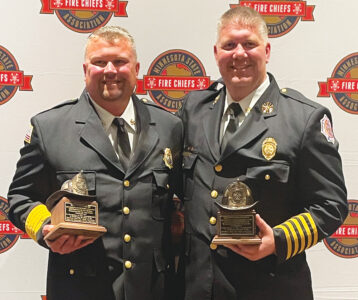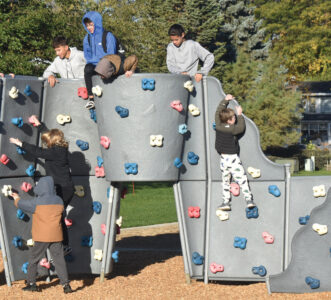Marshall middle school sees growing improvement with Pathway courses
MARSHALL — The Marshall Middle School has reported growing benefits throughout their Pathways programs, which are various structured classes that allow students to further explore possible interests or career paths.
Middle school principal Peggy Reynolds and assistant principal Bennett Appel brought a group of teachers to present updates to the school board last Monday on their pathway classes. Agriculture teacher Leah Bueltel, Practical Assessment Exploration System (PAES) instructor Erica Hess, Family and Consumer Sciences (FACS) teacher Laura Moorse and Spanish teacher Sara Runck all gave presentations.
Bueltel said her class is very hands-on, and works on a number of lessons regarding the agricultural field.
“Our main focus is plants, soils, animals, agriculture technology and our ag-byproducts. So, pretty much everything that we have in our everyday life is what I’m trying to show them. Where it comes from and how it is marketed, produced and then sent out to everybody else,” Bueltel said. “A lot of the times, they are working in groups, so they are doing a lot of student collaboration with kids that they might not normally talk to. I do like to mix up the groups to see how they interact with each other, and I have seen a lot of friends come out of this when they’re working together for eight long weeks.”
Along with other updates from Bueltel, the students analyze soil properties and nutrients with proper planting techniques in their plant science lessons. With animal science, students work with breed identification and livestock terminology, and discover where everyday items come from in the by-product sessions. Furthermore, students learn equipment identification and also go over agricultural careers.
“(We) just show a whole bunch of different things that the kids have been doing and how they can take these skills that they learned, and take them into high school with them,” Bueltel said. “It also has them learning where their food comes from, where their clothes come from, where everything comes from, and how they can make that everyday connection, especially considering that Marshall is an agricultural community.”
The PAES lab works to expose students to different career fields.
“There’s five different career areas … Business marketing, computer technology, construction industrial, processing production and consumer service,” Hess said. “This is the original PAES (structure), with 265 jobs. Students (are) in an eight week, or one-quarter long class, so they’ll go through as many jobs as they possibly can.”
Hess said the lab has been growing, including new additions like a medical lab, hotel and hospitality, cosmetology, floral design, graphic design and more. Hess added that they’ve been able to make additions though grants.
Hess also noted that community members that are professionals in specific areas of the lab will often come in and help students as well.
With FACS, Moorse uses the class to go over a variety of life-skills, with advanced lessons in older grades.
“For sixth grade, we do foods, personal finance and then relationships and character. Foods, it’s super basic. We just learn all about kitchen safety. What measuring tools do we have? How do you read a recipe, what ingredients you might need, working with groups,” Moorse said. “For personal finance, they learn all about checking accounts, savings accounts, credit cards, how to budget … They learn how to write checks.”
In seventh grade, Moorse said they introduced interior design this year where students learn about room functions, floor plans and layout. They also do sewing lessons, and more advanced work with food with identifying different groups and working through recipes.
“It just teaches kids how to become adults, whether that’s learning how to manage your money, cooking a meal, taking care of a child, or just preparing for any of the careers that are linked to it,” Moorse said. “They’re always wondering, like, ‘How is this going to help me as I get older?’ That’s basically what my class is, is to help them connect to real life and thrive in the community.”
Runck’s exploratory and advanced Spanish classes give students the opportunity to collaborate with one another to learn about a new culture, and build off of it if they choose to continue classes.
“It’s (exploratory Spanish) a quarter long class where they’ll focus on cognates, the super-seven verbs, which are the seven most commonly used verbs, calendar, geography and culture,” Runck said. “We do that through so many different things. We do games, we do interviews, we do music, reader’s theater … They basically go from not having any experience, or most of them not having any experience with Spanish, to reading a novel by the end of the quarter.”
Advanced Spanish was introduced last year, Runck noted.
“This really serves our students who already speak Spanish. It’s a really unique opportunity for them to get to explore their bicultural identity, and be proud of the fact that they are already multilingual, and it really celebrates that for them,” Runck said. “We focus a lot on Spanish literacy skills, because a lot of these students know how to speak and understand Spanish, but they haven’t had any experience reading or writing Spanish. So, we do a lot of the same things, just at a much deeper level in that class.”
Runck added that besides learning a new language, the class offers cognitive and social benefits.
“It helps students to leave their comfort zone a lot. I know learning Spanish is not going to be a passion for all the students, but they still get a lot out of these classes, just for getting exposure to new things,” Runck said. “A lot of them get to learn a little bit about several different countries, and get to know a little bit more about what is different in the world.”



